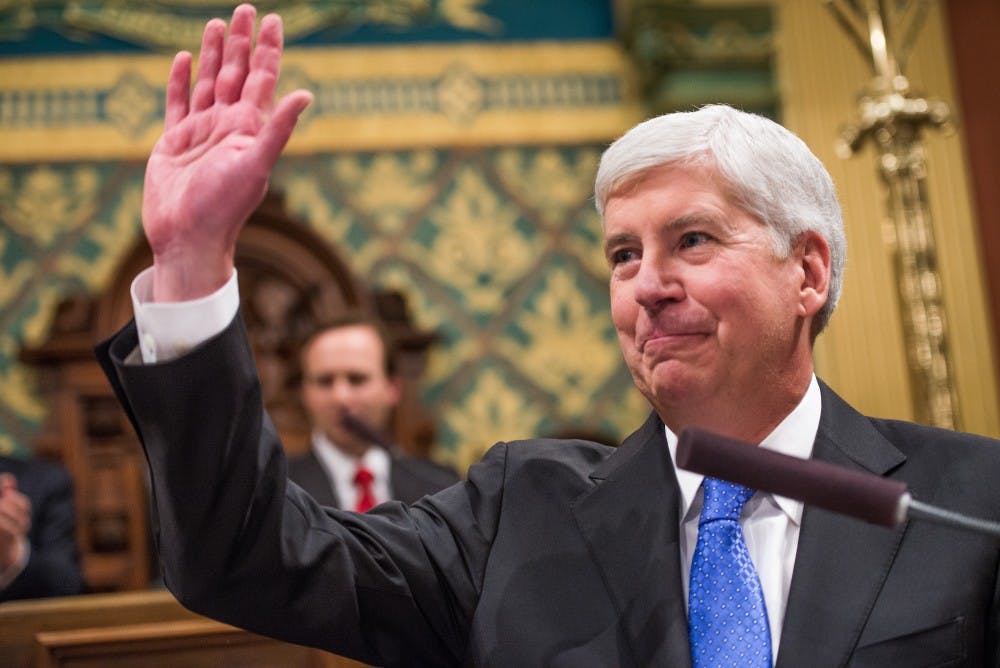Gov. Rick Snyder focuses on Michigan's successes, future in final State of the State Address

LANSING – Gov. Rick Snyder said Michigan is better off now than it was in 2010 during his final State of the State Address Jan. 23.
Snyder discussed efforts to improve areas such as education and infrastructure during his eighth address before the state legislature at the Michigan Capitol Building. He took office on Jan. 1, 2011.
The governor did not specifically mention higher education funding, but highlighted K-12 education programs and the increase of early college preparatory classes.
Snyder did mention how sexual assault on college campuses is a problem for the state. He praised his wife, Sue, for her efforts in curbing this issue and said there has been $1.6 million in grants to help educate people on sexual assault and offer support for victims. Rick Snyder referenced the case involving Larry Nassar, the ex-USA Gymnastics doctor was sentenced to up to 175 years in prison Jan. 24 for sexual abuse. Snyder said to reach out and support the survivors “to ensure cases like this never happen again.”
Snyder discussed problems that have plagued the state, including the Flint water crisis and opioid epidemic.
“In Flint, we continue to receive good water results,” Snyder said, adding that the water quality is on par with some other cities.
Snyder apologized for the Flint water crisis in January 2016. During Tuesday’s address, he noted the state is working to change its “lead and copper rule.” He delved into the economic progress in Flint, saying the city was adding jobs and has a new Ferris Wheel building.
Discussing opioid use, Snyder thanked the Michigan State Police’s Angel Program, which allows drug addicts to visit police officers and ask for help.
“I can tell you we’ve saved lives already,” he said.
In February, Snyder plans to roll out the state’s “Marshall Plan” that seeks to develop talent for the state’s workforce. Snyder expressed his support for skilled trades and its impact on the Michigan economy.
Snyder also referenced the state’s failure to land in the Top 20 for Amazon’s second headquarters. He said talent is a top priority.
Infrastructure-wise, Snyder said he is going to ask to put more money into the state’s budget to improve roads. The groundbreaking for the Gordie Howe International Bridge, which will connect Detroit to Canada, is expected to take place later this year, he said. Snyder added a private partnership could reduce the timeframe for a construction project on I-75 by a decade.
In the next week, Snyder said he will release each day an initiative that has to do with infrastructure and environment. This includes the state’s need for broadband access, efforts to improve recycling and efforts to remove Asian Carp from the Great Lakes.
“Let’s get together as Michiganders and invest what we need to to protect the Great Lakes,” Snyder said.
Near the end of his address, Snyder advised to approach government in ways that do not place the burden on future generations. He also said voting for candidates that use the word “fighting” is a “red flag.”
“(Fighting) belongs on the beaches of Normandy, not the beaches of Lake Michigan,” he said.
Early in his address, Snyder compared two Wall Street Journal articles. One was dated in 2009 and was titled “The State of Joblessness.” The other, from September 2017, is titled, “The Michigan Comeback Story.”
Snyder said Michigan is No. 6 in the nation in private-sector jobs, with the state having created 540,000 since December 2010.
“Folks, we’re back — and we’re only going to keep going up,” Snyder said.
State Rep. Roger Hauck, R-Union Township, thought Snyder's address was "positive" and related back to the residents of his 99th District, which includes Isabella County.
"We have some clean-up sites that need to be cleaned up," Hauck said. "That would be a big initiative. We can try and improve (education for high schoolers) as much as we can. The problem with education is — my son's a fourth-grade teacher — I think we get too involved in it instead of letting the teachers teach.
“The skilled trades are huge for our area."
Editor's Note: This article has been updated to reflect the edition in the Jan. 25 edition of Central Michigan Life.



